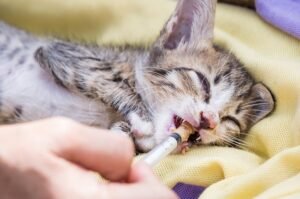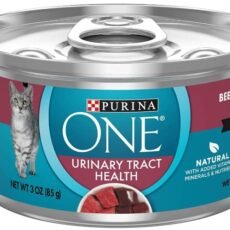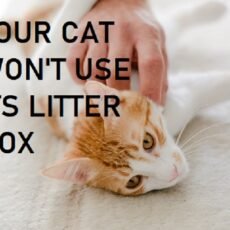We all love healthy and active cats. However, coming home to see your furry friend looking quiet and lethargic may signify a vomiting and diarrhea problem. So how do you solve your kitten vomiting and diarrhea problem?
While your kitten may throw up even when not sick, constant vomiting accompanied by diarrhea should give a cause for concern.
Possible Causes of Your Kitten Vomiting and Diarrhea

Your kitten’s vomiting and diarrhea may be caused by the following:
· Hairballs
Kittens can have hairballs stuck in their stomachs during grooming. Your kitten might get to throw up hairballs every week or two to prevent blockages in their intestines. (Hairball lubricant)
· Foreign objects
Foreign objects in their digestive tract may also cause vomiting or diarrhea in cats. For example, materials such as rubber bands or pieces of string may pose a problem in your kitten’s gut.
· Food poisoning
Several household items such as cleaning products, decorating chemicals, and pest control agents are poisonous to cats.
· Food allergies
This is an adverse reaction caused by the immune system. Common food associated with allergies in cats includes beef, fish, chicken, and dairy.
· Intestinal parasites
Examples of intestinal parasites that cause cat problems are roundworms, tapeworms, and hookworms.
· Feline parvovirus
This virus is often common in kittens and is often fatal.
· Inflammatory bowel disease
This condition makes the cat’s gastrointestinal (GI) tract severely irritated and inflamed.
Signs of Kitten Vomiting and Diarrhea
The following are signs that indicate your kitten may be suffering from vomiting and diarrhea:
- Lethargic and weight loss
- Fever
- Weight loss
- Nausea
- Fever
- Excessive swallowing
- Lip licking
- Vomit; look out for the volume, frequency, and color.
- Diarrhea; Watch out for the color, frequency, and signs of blood.
- Pale or cold gums
- Lack of appetite
How To Treat Your Kitten’s Vomiting and Diarrhea
There are several methods you can adopt in treating kitten vomiting and diarrhea. You must know the right measures to ensure your kitten’s speedy recovery.
1. Choosing to feed or not to feed your cat
There seems to be a divide on whether to feed a cat battling vomiting and diarrhea. But unfortunately, starving your cat may cause a life-threatening liver condition.
However, it is advised that you avoid feeding your cat for 24 hours if your cat experiences vomiting, diarrhea, or both.
Provide your cat with only clean drinking water for the period to allow the gut to rest. Feeding your kitten with vomiting and diarrhea issues could stimulate muscular contractions in the stomach, causing your kitten to vomit.
Note that if your kitten continues to vomit after 24 hours, you should see a vet as soon as possible.
2. Feed your kitten unseasoned food
Once your kitten’s vomiting and diarrhea minimize, you can begin to feed her small portions of bland food such as bland chicken, turkey, etc.
3. Space out your kitten’s meal
Spacing your kitten’s meal would allow her to digest it and assist her stomach in readjusting to food after her illness.
4. Reintroduce regular food to your kitten’s diet
Once your kitten has passed normal stool for 24 hours, begin a two to a three-day gradual transition to regular food.
During the transition period, bacteria in your cat’s gut adjust to normal food. Here is what a typical transition might look like:
- Day 1. Give ¾ bland diet and ¼ regular food to your kitten
- Day 2. Feed ½ bland diet and ½ regular food
- Day 3. Feed ¼ bland diet and ¾ regular food
- Day 4. Transit fully back onto regular food
5. Ensure your kitten is hydrated
In ensuring your kitten is well hydrated when experiencing a vomiting and diarrhea problem, the following measures would come in handy:
-
Look out for signs of dehydration by checking out your kitten’s skin
You can check if your cat’s skin is dehydrated by lifting the scruff off her shoulder with your finger or thumb. If the skin falls back into position immediately, your cat is dehydrated.
-
Provide your kitten with fresh and clean drinking water
Cats can be quite demanding in their choice of drinking water when ill. Some prefer the taste of mineral water to tap water because it contains less chlorine. Ensure you provide different kinds of water for your cat to encourage it to get adequate fluids and stay hydrated. Virbac Rebound Recuperation Formula for Cats is a liquid formulated to help cats recuperate from illness.
-
Give your cat an electrolyte replacement solution
Electrolyte replacement solutions are designed for humans. However, they can also be taken by cats. Examples are Pedialyte and Dioralyte. Electrolyte solutions are mixed with water and are designed to replace lost electrolytes.
Note that some cats might not like the salty taste of these solutions. If your cat falls in this category, switch to just water.
-
Hydrating your kitten with a syringe

One way to treat your kitten’s vomiting and diarrhea is by ensuring your cat is well hydrated. Consider using a sterilized syringe if your kitten has difficulty drinking. You can do this by placing the nozzle of the syringe behind your cat’s teeth and pressing the plunger down slowly to give her time to drink.
Try giving your kitten 5 to 10ml of water every half an hour.
-
Seek medical attention if your kitten vomits every time she drinks water
You must restore the balance at which your kitten losses and gains fluids. If your kitten vomits every time she drinks fluid or cannot keep fluids down, seek immediate veterinary care. A vet will decide whether your cat needs intravenous fluids based on her health.
6. Give your cat medications
You can consider several medications in treating your kitten’s vomiting and diarrhea issues. They include:
- Probiotic supplement: Helps your cat to recover from diarrhea.
- Famotidine: It helps to soothe gastric ulcers and manage stomach inflammation.
- Kaolin and Pectin: They are designed to serve as protective barriers in the gut walls of cats.
- Digestive supplement: Formulated to aid digestion.
How to prevent vomiting and diarrhea?
- Avoid giving your cat salty, spicy, or fatty foods.
- Gradually introduce new food to your kitten and check for intestinal disturbances.
- Keep probiotics and electrolyte supplements in your home in the case of an emergency.
- Ensure you deworm your cat frequently.
- Vaccinate your kittens against feline parvovirus.
Final Thoughts
Vomiting and diarrhea can be quite distressing for your kittens.
Book an appointment with your vet if you seek the best way to handle your kitten’s vomiting and diarrhea.
You may also be interested in reading our articles “What do 4 Week Old Kittens Eat?” and “Can Cats Drink Cow’s Milk?”





